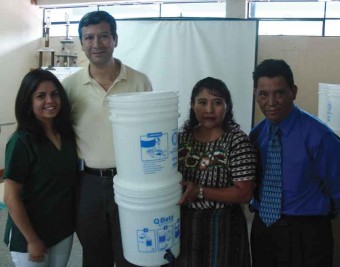Requisition-less Water
Highland hospital slakes its thirst and reduces its paperwork—a need, discovered by accident, is met

(l-r) Nutritionist, María Esmeralda Arriaga; Atitlán Rotary President, Fredy Lara; medical chief, Dr. Irene Quiejú; administrator, Victor García
Until recently, guarding the purity of this water at Sololá’s thirsty public hospital was a bureaucratic proposition for the people who worked there and an expensive proposition for those who visited. Hospital personnel, and patients and their families, all longed for relief. The old system had broken down a year earlier.
One thing had not changed. The water drunk by patients still arrived through a sink in the cramped lunchroom used by the pharmacy, stockroom and kitchen employees. From there it was fed to an old purification unit. This forlorn machine gave up the ghost in 2008 from overuse but still sat in a lunchroom corner.
To replace it, Patricia Armas, the clerk in charge of that part of the hospital, acquired a ramshackle old heating pad and borrowed a 22-liter pot from the kitchen. This was certainly better than nothing; microbios could be eliminated. But there was still no filtration for dirt, organic debris, toxic metals and other contaminants.
But even before the machine broke down, there had been other problems. Drinking water had to be ordered from Armas’ section. Whenever a ward needed more, a requisition had to be written, then signed both by a physician and the shift nurse. Then a nursing assistant had to fetch the water, which was not always ready.
Hospital nutritionist María Esmeralda Arriaga was at wit’s end over the matter.
“Sick people need more water than healthy people,” she says, “and purer water. Without it, they take longer to heal. We’re supposed to make people well here. But we can’t even give them proper hydration.”
In desperation, patients had come to depend on visitors to buy them water. This demand created a land-office business for several small tiendas on the edge of, or within, the hospital premises. But each 1.5-liter bottle cost Q7, which was burdensome for patients and their visitors, almost all of whom are people of limited means. In June, an officer of the Lake Atitlán Rotary Club (CLRA) noticed all this while visiting a friend. Within a week, CLRA had acquired through Maya Familias (a Panajachel charity) 10 donated filters that require no electricity and are gravity-driven. The filters, donated by the Florence Rotary Club of Oregon, have no moving parts. Their elements must be renewed every 18 months.
Hospital administrator Victor García and medical chief Dr. Irene Quiejú were thrilled to learn that relief was on the way. Three Rotarians and a Maya Families representative came to the hospital conference room to assemble the filters and give an orientation in an atmosphere described as “spontaneously ceremonial.”
The CRLA officer returned a week later to monitor the application of the gift. He found that the hospital’s water worries had ended in a single fell swoop. The emergency room, the surgery chamber, the out-clinic and all of the wards—men, women, pediatrics, maternity, quarantine and IGSS— each had its own filter. Not only did they now have clean water on tap, but they no longer had to requisition or, in the words of one nurse, “beg and wait.”
If anyone is as happy with the change as nutritionist Arriaga, it is Patricia Armas. The 10th filter sits in her lunchroom. Now employees, too, can drink their fill of pure water.
“I’m free of this ridiculous paperwork,” she says, “and running back and forth, refilling and heating that old pot. And the patients don’t have to wait any more for water that wasn’t that good, anyway.”
The Atitlán Rotarians have taken on the Sololá hospital as a project. For additional facts and pictures associated with this story, see their website at www.atitlanrotary.org